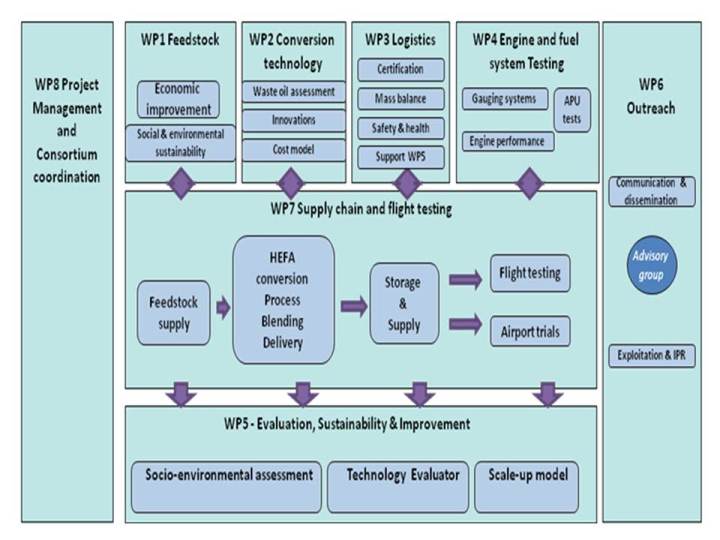Initiative Towards sustAinable Kerosene for Aviation (ITAKA) | | | Objective | |
ITAKA is an EC funded research project that intends to support the development of aviation biofuels in Europe, in an economically, socially and environmentally sustainable manner, improving the readiness of existing technologies and infrastructures.
The objective is to develop a full value-chain in Europe to produce sustainable Synthetic Paraffinic Kerosene (SPK) at a large enough scale to allow testing in existing logistic infrastructures and in normal flight operations in Europe.
In addition, according to the objectives set by the European Advanced Biofuels Flight Path and the SWAFEA study recommendations, it also represents an instrument to coordinate efforts and use complementarities between European Initiatives on sustainable aviation fuels.
| Category Deployment
Value-chain stepFull value-chain
Type of pathway Oleaginous / Hydroprocessing
Starting time and durationNovember 2012 - October 2016
Stakeholders Ministries, national agencies, industry, fuel producers, airlines, NGO
Regional scope Regional
Involved countries Europe
Status On-going | | Description |
ITAKA is a collaborative project framed in the implementation of the European Union (EU) policies. In particular, it supports the implementation of the European Industrial Bioenergy Initiative (EIBI) of the European Strategic Energy Technology Plan (SET-Plan). It specifically aims to contribute to the fulfilment of some of the short-term objectives (2015) of the EU Advanced Biofuels Flight Path initiative, the goal of which is to reach a target of 2 million tons of biofuels used in European civil aviation by 2020.
As the first-of-its-kind project in the European Union, ITAKA will link supply and demand by establishing commercial relationships under guaranteed conditions among feedstock growers, biofuel producers, distributors and end-users.
ITAKA targets camelina oil as the best sustainable feedstock that can be produced timely at enough quantity within Europe to produce biojet fuel. The oil is converted into drop-in aviation fuel through the HEFA (Hydro-processed esters and fatty acids) pathway. On the other hand, used cooking oil (UCO) is also being assessed for its use as biojet fuel feedstock.
ITAKA addresses challenges in two main areas:
- Development of commercial scale production and study of the implications of a large-scale use;
- Research on sustainability, economic competitiveness and technology readiness.
The generated knowledge will allow to identify and address barriers to innovation and commercial deployment.
ITAKA project work plan relies on the following Work Breakdown Structure (WBS).

-
WP1 is aiming at improving key aspects of camelina cultivation, including economic, social and environmental sustainability aspects (productivity and land use will in particular be considered).
-
WP2 includes the research tasks related to the conversion technology.
-
WP3 includes demonstration tasks related to the improvement of logistics (while the main demonstration tasks of the supply chain are carried out in WP7).
-
WP4 covers the research tasks for the flight testing phase.
-
WP5 will focus on sustainability, gathering technical, economic, social and environmental data to assess the impacts, effects and regulatory implications of the large-scale use of biofuels in aviation.
-
WP6 contains the tasks related to the Plan of Use and Dissemination of Foreground created in ITAKA, complemented with networking and outreach activities, including the development of an Advisory Group.
-
WP7 comprises the demonstration activities of the project and will consist in producing large enough biofuel batches to enable the demonstration of large scale supply and operational use. These activities include feedstock production, conversion technology, logistics, supply and in-flight use.
-
WP8 comprises the project management and Consortium Coordination.
| | Partners | |
Senasa, AirBP, Airbus group, Asociatia Centrul de Biotechnologiimicrobiene, Avinor, Compañía Logística de Hidrocarburos, École Politechnique Federale de Lausanne, Embraer, Lufthansa, The Manchester Metropolitan University, Neste Oil, SAS, SkyEnergy, Camelina Company España, Consorzio per la Ricerca e la Dimostrazione Sulle Energie Rinnovabili.
Collaborators: KLM Royal Dutch Airlines, USAMVB (Universitatea de Ştiinte Agronomice şi Medicină Veterinară Bucureşti)
| | | Achievements to date | |
Since the commencement of this project, the team has seen the following achievements:
-
Large-scale camelina plantations implemented and harvested in 2013;
-
Improved agronomical protocol for camelina in Spain;
-
First tests for new camelina varieties selection and improvement;
-
Ongoing 2014 camelina plantations (2000 ha);
-
UCO-based biojet flight demonstration program has started (May-December 2014) from Amsterdam to Bonnaire on A330-200. For improved feedstock production: - Four large-scale camelina plantations implemented and harvested in Spain, plus two more in Romania.
- Improved agronomical protocol for camelina in Spain;
- First tests for new camelina varieties selection and improvement;
- UCO-based biojet flight demonstration program completed (May-December 2014) from Amsterdam to Aruba and Bonaire on A330-200 [18 flights on HEFA from UCO blend, one engine to compare data from one engine to another]
- Neste produced the first batch of HEFA biojet based on camelina oil produced in Europe. The camelina plantations are RSB certified. The biojet also comply with the EU RED sustainability requirements. That batch of biojet has been used for:
- The first worldwide use of biojet in the fuel farm and hydrant systems of an airport, allowing flights in an non-segregated based with biojet blends for Lufthansa, SAS y KLM.
- 80 flights with the Embraer E190, operated by KLM CittyHopper from Oslo to Amsterdam (short haul), with segregated supply to the plane, for the two engines, in order to gather more information complementing the flight series initiated with the long range flights to Aruba and Bonaire.
In addition, important lessons have been learnt, key market barriers and enablers identified, and best-practices designed in relation to the general aim of ITAKA. As a result, a set of recommendations for the correct deployment of the biojet value chain in Europe is being developed.
| | | Contact information | |
-
Project website: www.itaka-project.eu
-
EU FP7 register in CORDIS
-
Coor
dinator contact data: Inmaculada Gomez Jimenez, Observatory of Sustainability in Aviation (SENASA), Tel:+34-913019847 - www.obsa.org - www.senasa.es
| |
|
